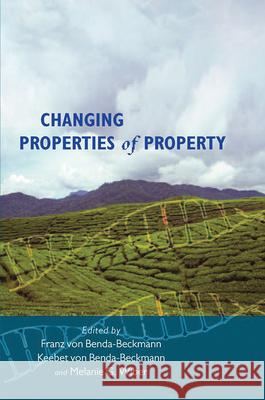Changing Properties of Property » książka
Changing Properties of Property
ISBN-13: 9781845457273 / Angielski / Miękka / 2009 / 376 str.
Changing Properties of Property
ISBN-13: 9781845457273 / Angielski / Miękka / 2009 / 376 str.
(netto: 148,42 VAT: 5%)
Najniższa cena z 30 dni: 140,79
ok. 22 dni roboczych.
Darmowa dostawa!
"Collections often are uneven and not coherent enough; fortunately, this is not the case at all here: in spite of the great number of contributions they complement each other well, with many cross references..." - Verfassung und Recht in Ubersee "The volume represents an excellent model for what may be considered a constant duty of the researcher: always questioning the epistemological validity of concepts, theories, main instruments in research work, always trying to readjust them in order to avoid over-generalise erroneous assumptions. This implies a dynamic and flexible positioning toward empirical data and theory at the same time, something that the contributors to this volume accomplished with success, thus opening new paths in property analysis." - Social Anthropology As an important contribution to debates on property theory and the role of law in creating, disputing, defining and refining property rights, this volume provides new theoretical material on property systems, as well as new empirically grounded case studies of the dynamics of property transformations. The property claimants discussed in these papers represent a diverse range of actors, including post-socialist states and their citizens, those receiving restitution for past property losses in Africa, Southeast Asia and in eastern Europe, collectives, corporate, and individual actors. The volume thus provides a comprehensive anthropological analysis not only of property structures and ideologies, but also of property (and its politics) in action. Franz von Benda-Beckmann is head of the project group "Legal Pluralism" at the Max Planck Institute for Social Anthropology at Halle, Germany. He is professor for law in developing countries at Wageningen University, the Netherlands and honorary professor at the University of Leipzig. His research in Malawi and Indonesia focuses property and inheritance, social security, decentralization and legal anthropological theory. Keebet von Benda-Beckmann is head of the project group "Legal Pluralism" at the Max Planck Institute for Social Anthropology at Halle, Germany. She is a professor of Anthropology of Law at Erasmus University Rotterdam and honorary professor at the University of Leipzig. Her research focuses on disputing, decentralisation, social security, and natural resources in Indonesia and the Netherlands. Melanie Wiber is Professor of Anthropology at the University of New Brunswick, Fredericton, New Brunswick, Canada. Her research focuses on new forms of property, economic and legal anthropology, natural resource management and especially agriculture and the fishery
"Collections often are uneven and not coherent enough; fortunately, this is not the case at all here: in spite of the great number of contributions they complement each other well, with many cross references..." · Verfassung und Recht in Übersee"The volume represents an excellent model for what may be considered a constant duty of the researcher: always questioning the epistemological validity of concepts, theories, main instruments in research work, always trying to readjust them in order to avoid over-generalise erroneous assumptions. This implies a dynamic and flexible positioning toward empirical data and theory at the same time, something that the contributors to this volume accomplished with success, thus opening new paths in property analysis." · Social AnthropologyAs an important contribution to debates on property theory and the role of law in creating, disputing, defining and refining property rights, this volume provides new theoretical material on property systems, as well as new empirically grounded case studies of the dynamics of property transformations. The property claimants discussed in these papers represent a diverse range of actors, including post-socialist states and their citizens, those receiving restitution for past property losses in Africa, Southeast Asia and in eastern Europe, collectives, corporate, and individual actors. The volume thus provides a comprehensive anthropological analysis not only of property structures and ideologies, but also of property (and its politics) in action.Franz von Benda-Beckmann is head of the project group "Legal Pluralism" at the Max Planck Institute for Social Anthropology at Halle, Germany. He is professor for law in developing countries at Wageningen University, the Netherlands and honorary professor at the University of Leipzig. His research in Malawi and Indonesia focuses property and inheritance, social security, decentralization and legal anthropological theory.Keebet von Benda-Beckmann is head of the project group "Legal Pluralism" at the Max Planck Institute for Social Anthropology at Halle, Germany. She is a professor of Anthropology of Law at Erasmus University Rotterdam and honorary professor at the University of Leipzig. Her research focuses on disputing, decentralisation, social security, and natural resources in Indonesia and the Netherlands.Melanie Wiber is Professor of Anthropology at the University of New Brunswick, Fredericton, New Brunswick, Canada. Her research focuses on new forms of property, economic and legal anthropology, natural resource management and especially agriculture and the fishery











